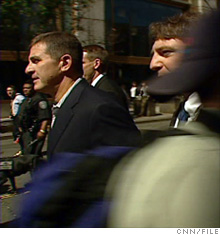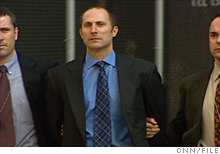Why the Cioffi and Tannin trial matters to JPMorgan
Even though Ralph Cioffi and Matthew Tannin did their alleged dirty work at Bear Stearns, their criminal case could impact Jamie Dimon's bottom line.
 |
| Ralph Cioffi |
 |
| Matthew Tannin |
NEW YORK (Fortune) -- A gleaming Manhattan skyscraper and a group of well-heeled stockbrokers were some of the coveted assets that JPMorgan Chase snatched up when it acquired Bear Stearns for $10-a-share in March 2008. But like the stick of dynamite that lies hidden in one of Wiley Coyote's birthday cakes, JPMorgan also took on the liability for all of Bear Stearns ongoing litigation as part of that merger. So when the criminal trial of Ralph Cioffi and Matthew Tannin, the managers of the two failed Bear Stearns hedge funds that sparked a market meltdown in 2007, begins next Tuesday, JPMorgan's interest in the case will be more than academic.
To be clear, the bank has no exposure in the criminal case itself, but the evidence introduced at the trial of Cioffi and Tannin could have tremendous impact on civil litigation pending against JPMorgan (JPM, Fortune 500). Among the most high profile of these upcoming civil cases is a recent billion-dollar lawsuit filed by activist investor Bruce Sherman against Bear. Another is a $2 billion lawsuit brought by Bank of America (BAC, Fortune 500) against Bear that a federal judge recently allowed to proceed to trial.
The reason Cioffi and Tannin's criminal case matters for the ongoing civil litigation is that as testimony and evidence is presented in the criminal trial, the roles of various senior Bear Stearns executives, if any, in the collapse of the hedge funds may be revealed. These revelations could prompt a new wave of civil suits or strengthen pending ones. Also, the greater the role that Cioffi and Tannin's bosses play in the trial, the more costly the case becomes for JPMorgan.
As part of the merger agreement with Bear Stearns, JPMorgan agreed to indemnify each of Bear's current and former officers and directors for six years following the completion of the merger, or until May 2014. The list of those whose legal fees go on JPMorgan's tab include Jimmy Cayne, the former CEO and board chairman, Alan Schwartz, the CEO at the end and a board member, Alan "Ace" Greenberg, another former Bear CEO and board member, and Warren Spector, the former co-president and the man ultimately in charge of Bear's asset management business where Cioffi and Tannin worked.
Cioffi and Tannin stand accused by the U.S. government of conspiracy, securities fraud, and wire fraud. Cioffi was also charged with insider trading. According to the government, by March 2007, Cioffi and Tannin believed the two hedge funds they supervised were "in grave condition and at risk of collapse" but failed to inform the funds' investors and creditors and instead "made misrepresentations to stave off withdrawal of investor funds and increased margin calls from creditors in the ultimately futile hope that the funds' prospects would improve and that the defendants' incomes and reputations would remain intact."
Investors lost more than $1 billion when the funds were liquidated in July 2007. Attorneys for the two men argue -- on the contrary -- that their clients did nothing illegal or criminal but merely had poor judgment and made investment mistakes at a time when the markets were crumbling in catastrophic, unprecedented ways.
Obviously, the dealmakers at JPMorgan were well aware they had bought Bear Stearns' liabilities along with its $370 billion in assets. (That is the case in any stock-for-stock merger). So while the $10-a-share deal cost JPMorgan around $1.2 billion, dealmakers there did underestimate the amount the bank would need to set aside to cover costs associated with the deal. The bank initially set aside another $8 billion to cover other costs that include absorbing ongoing losses from the write-downs of squirrelly assets, to severance payments for soon-to-be dismissed Bear employees, to all the litigation that has ensued in the wake of Bear's rapid demise.
JPMorganChase now estimates the total cost of the Bear Stearns deal to be around $13 billion, or some $3 billion more than initially anticipated during that hectic week of deal making.
Some civil cases that could further negatively impact JPMorganChase's rate of return on the Bear deal include last week's suit from Bruce Sherman, the CEO of Private Capital Management and once one of Bear's largest shareholders with a stake of about 5.9%. Sherman sued Bear Stearns, Jimmy Cayne, Warren Spector and Deloitte & Touche, Bear's auditors, in federal court in the Southern District of New York. From its peak valuation in January 2007, Private Capital Management lost around $1 billion in value when Bear collapsed.
Sherman alleges in his complaint that the defendants "fraudulently overstated the value of Bear's mortgages, mortgage- and asset-backed securities and other derivative financial instruments, the adequacy of its liquidity and capital reserves and the quality of Bear's risk management" with the intent of getting Sherman to hold onto his Bear shares and to invest more money in Bear, both of which Sherman claims he did.
Sherman, represented by superstar lawyer David Boies, is alleging four counts of wrongdoing, including violation of securities laws. He is seeking unspecified damages plus interests for the losses he suffered from continuing to hold onto Bear Stearns stock. Sherman and other potential litigants will likely be watching the Cioffi and Tannin trial closely. (The defendants have not yet filed a response to the complaint with the court.)
"There is a lot of potential for additional litigation here against Bear Stearns -- and now JPMorgan," explained Jeffrey Liddle, the senior partner at Liddle & Robinson LLP, a firm that represents Wall Streeters against their former firms. "There is plenty of potential litigation that could go all the way up to Jimmy Cayne if it is discovered in the Cioffi trial that people above Cioffi were aware of what happened there."
Also last week, a federal judge allowed a $2 billion lawsuit brought by Bank of America against Bear Stearns to proceed to trial, despite JPMorgan's efforts to get it dismissed. The Bank of America complaint alleges that the hedge fund managers deceived Bank of America in a "desperate" effort to obtain more capital for the hedge funds in May 2007 by selling to Bank of America some $4 billion of mortgage-related securities from the hedge funds and obtaining a further $1 billion line of credit from the bank.
The deal closed at the end of May 2007. In its complaint, Bank of America called the hedge fund managers behavior "egregious" and wrote they "were desperate to secure liquidity to prop up the failing hedge funds" and "not only misled the bank into structuring, marketing and closing the CDO-squared transaction, but they compounded" the situation by arranging for the additional $1 billion line of credit. "When the hedge funds were unable to meet their obligations to repay the bank for the short-term financing, the bank suffered significant additional losses," according to the complaint.
Another potential downside for JPMorganChase of the Cioffi/Tannin trial is that it might spur a rash of new costly litigation against the firm from, say, investors in the hedge fund who still feel aggrieved by the their losses.
Since JPMorgan executives would not comment for this story, it is hard to know whether the rising litigation costs have given them buyer's remorse on the Bear deal. It is doubtful, though. At the moment, JPMorgan executives take comfort from the fact that the company paid around $13 billion for Bear -- the $1.2 billion for the equity, the $1 billion first-loss of the $29 billion of assets the Fed ring-fenced, another $11 billion or so of additional known and unknown costs relating to asset write downs, severance payments and litigation -- and got a state-of-the-art midtown office tower -- thus avoiding having to build a new tower downtown near Ground Zero -- plus around $1.25 billion in ongoing pre-tax income from the businesses it decided to keep. That's a deal JPMorgan would probably do again. ![]()
-
 The retail giant tops the Fortune 500 for the second year in a row. Who else made the list? More
The retail giant tops the Fortune 500 for the second year in a row. Who else made the list? More -
 This group of companies is all about social networking to connect with their customers. More
This group of companies is all about social networking to connect with their customers. More -
 The fight over the cholesterol medication is keeping a generic version from hitting the market. More
The fight over the cholesterol medication is keeping a generic version from hitting the market. More -
 Bin Laden may be dead, but the terrorist group he led doesn't need his money. More
Bin Laden may be dead, but the terrorist group he led doesn't need his money. More -
 U.S. real estate might be a mess, but in other parts of the world, home prices are jumping. More
U.S. real estate might be a mess, but in other parts of the world, home prices are jumping. More -
 Libya's output is a fraction of global production, but it's crucial to the nation's economy. More
Libya's output is a fraction of global production, but it's crucial to the nation's economy. More -
 Once rates start to rise, things could get ugly fast for our neighbors to the north. More
Once rates start to rise, things could get ugly fast for our neighbors to the north. More







